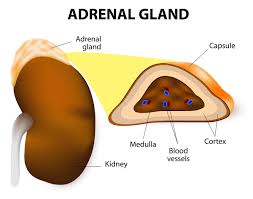 We’ve been ‘staying safe’ & ‘hanging in there’ for – oh, about 9 months now during this pandemic – while recently weathering the most contentious presidential election in US history. I think I’m well overdue for a post about our bodies most critical stress-coping glands – our adrenal glands!
We’ve been ‘staying safe’ & ‘hanging in there’ for – oh, about 9 months now during this pandemic – while recently weathering the most contentious presidential election in US history. I think I’m well overdue for a post about our bodies most critical stress-coping glands – our adrenal glands!
Our adrenals are the two walnut-sized glands that sit like little hats on top of both kidneys. Our energy, stamina, immunity, and even sex drive depends upon the proper functioning of our body’s adrenal glands. The adrenals have an outer layer or cortex that produces cortisol and an inner medulla that produces the fight or flight hormones: epinephrine and norepinephrine.

In Chinese medicine, the adrenals are called the ‘Root of Life.’ They function as ‘batteries’ which store our life energy and are also responsible for our immunological resilience. When undisturbed by stress, the adrenal glands secrete minute, yet precise and balanced amounts of cortisol in response to everyday changes in our internal circuitry. Cortisol affects all of the major physiological processes in our bodies – the utilization of carbohydrates and fats, regulation of blood sugar levels, maintenance of blood pressure, and the production of sex hormones. In general, how well we feel really depends upon how well these glands are functioning.
Adrenal fatigue is caused by everyday stress in all forms – whether it’s physical, mental, emotional, or even environmental. Stresses such as illness, poor diet, environmental toxicity, financial stress, relationship issues, and work-related pressure have a cumulative effect on adrenal gland function. The body responds to all of these stressful events in the same manner by secreting adrenal hormones. The repetitive cycle of stress causing adrenal hormone secretion eventually depletes our adrenals. We begin to suffer from reduced output and fatigue.
Because we are currently enduring a prolonged exposure to stress, and sustained stress can impact our bodies as trauma, now more than ever it’s important to take stock of our adrenal health…so we can implement changes and strategies that promote resilience of the HPA axis (hypothalamic pituitary adrenal) as well as effective stress adaptation of our adrenals, bolster our adrenals and thereby promote resilience.
Take the Adrenal Stress Test
If you answer yes to 3 or more of the questions below, it may be time for Adrenal Rehab:
- Do you have difficulty getting up in the morning?
- Feel a fatigue that’s not relieved by sleep?
- Crave salty foods?
- Notice that it takes an increased effort to complete everyday tasks?
- Have a decreased ability to handle stress…little things that never used to bother you are getting at you?
- Does it take longer to recover from illness or injury?
- Do you feel light-headed when standing up quickly?
- Experience PMS?
- Notice less enjoyment of activities that previously were fulfilling?
- Experience poor concentration, loss of train of thought, feeling fuzzy headed?
- Experience an afternoon lull in energy around 3 pm or 4 pm?
- Better energy after 6 pm?
Implement these dietary suggestions:
Quit or greatly reduce coffee. If this is impossible, consider turning your coffee into a meal by adding grass fed butter, MCT oil, and possibly even collagen protein powder.
Keep blood sugar levels as steady as possible: by eating protein at each meal, and don’t skip meals. Avoid/minimize refined carbs and sugars, and when you do eat them, balance them with protein Alcohol also spikes blood sugar, so moderation is important and having 4 hours before bedtime is ideal to process alcohol.
Adrenals like rhythm – get into a sleep/wake routine by going to bed and waking up within an hour of the same time each night. Avoid stimulating activities before bed – watching stressful news or suspenseful movies, or talking to drama queens close to bedtime will strain your adrenals!
If you’d like support to balance your adrenals, let’s chat!
